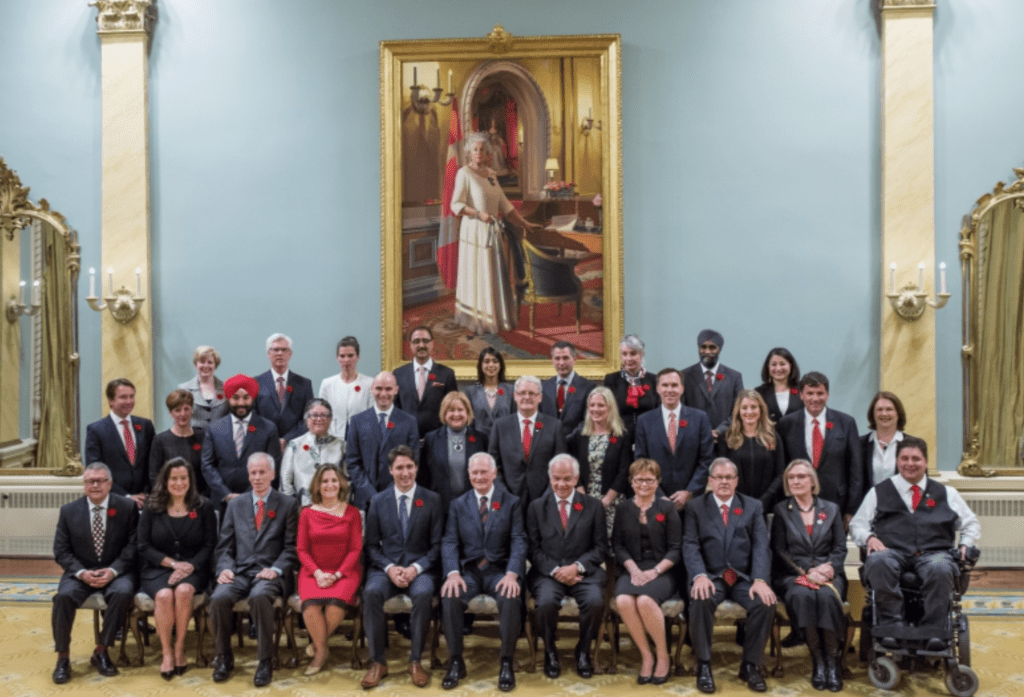The Constitutional Context of Cabinet-Making

Swearing-in day for the first “Trudeau ministry” (see below), Nov. 4, 2015/Adam Scotti photo
Philippe Lagassé
October 20th, 2021
Prime Minister Justin Trudeau will be unveiling a new cabinet next week. What will be happening during the ceremony at Rideau Hall on Tuesday? Will the Governor General be reappointing the Trudeau government or will we witness something more like a cabinet shuffle? The answer is both.
Politically, we are increasingly treating elections as government-selecting events. Our pundits’ fondness for speaking of Trudeau’s ‘third term’ or ‘new mandate’ hints at the idea that voters aren’t just picking MPs at the ballot box, but choosing who should lead the government. Governing parties, in turn, are more than happy to pretend that elections are akin to democratic anointings of their leader as prime minister, and that voters have vested them with popular mandates to fulfill their campaign promises. The fact that parties can govern despite carrying less than 40 percent of the popular vote can be brushed aside when we declare definitive winners on election night.
Constitutionally, however, the new cabinet will simply be a refresh of the same Trudeau government that’s been in office since 2015. The life of Canadian governments is tied to the prime minister. So, the Trudeau government began when he was sworn-in as prime minister on November 4rd, 2015, and it will only end when he resigns or is dismissed by the Governor General. If we want to be even more precise, we would not even call it the Trudeau government, but the Trudeau ministry, recognizing that it’s not technically his government, but the Queen’s, as in Her Majesty’s Canadian Government. Trudeau’s ministry, then, will have been in place over the course of three Parliaments. During that time, various ministers have come and gone, but the keystone to the whole thing, the prime minister, has been the same person. Accordingly, when the new cabinet is presented on Tuesday, it will have a different composition, but the same status from a constitutional standpoint.
Is this divergence between the political emphasis on novelty and the constitutional reality of endurance a problem? Does this really matter? Practically speaking it doesn’t, though it may tell us something about where our constitution is headed. The path we are on, moreover, involves important tensions that we haven’t yet resolved.
There are a number of advantages associated with keeping the lives of ministries and Parliaments separate. Above all, having an enduring executive government in place notwithstanding what’s happening with the legislature ensures that there are always ministers in office to make decisions. Canada never ceased having a cabinet during the election, we still have one now, and we will have one leading up to Parliament being recalled next month. Simply put, the constitutional reality leaves us with no doubt as to who deals with any routine matters or crises that arise.
Is this divergence between the political emphasis on novelty and the constitutional reality of endurance a problem? Does this really matter? Practically speaking it doesn’t, though it may tell us something about where our constitution is headed.
Keeping the lives of ministries and legislatures separate is also important for parliamentary democracy. It is possible to defeat one ministry and have another one take office during a single Parliament because elections aren’t what determines who governs. Instead, what matters is which party or parties can hold the confidence of the elected house. In recent years, for example, we have seen two provincial ministries in British Columbia and New Brunswick lose votes of no confidence and be replaced by another government without asking voters to go through another election. The current constitutional construct leaves the elected house as the arbiter of who governs and for how long.
Politically, though, these constitutional formalities are irrelevant at best, and antiquated at worst. The popular democratic perspective draws a direct connection between elections and which party governs. What matters is who wins the most seats on election night, not what arrangements or agreements might allow a ministry to maintain confidence. This perspective was at the heart of the prorogation controversy of 2008, where Prime Minister Stephen Harper argued that the opposition coalition seeking to replace his government had not been sanctioned by voters in the recent general election.
This view now pervades how most commentators talk about elections. If elections grant prime ministers their terms, on what grounds could an elected house overturn the will of the people? If elections vest governments with popular mandates, how can the Commons disagree, either by refusing to pass legislation or withholding confidence? If elections are about picking winners, how can we justify a group of ‘losers’ governing if they didn’t carry the most seats, but can find a way to maintain confidence?
When these tensions between politics and the constitution have arisen in recent decades, the latter has tended to prevail. Confidence still matters more than who is declared the winner on election night. Yet we have to ask long this disjunction can last. Our current constitutional rules, after all, are the product of long-expired political realities. It is unlikely that the existing configuration will survive new ways of talking and thinking about politics. In the coming decades, for instance, we might decide that the prime minister should resign and have their ministry formally reappointed following an election, out of respect for the popular democratic view that elections decide who governs.
We need to bear that in mind when Trudeau unveils his new government to fulfill the mandate he’s been given for his third term.
Philippe Lagassé is associate professor and the Barton Chair at the Norman Paterson School of International Affairs at Carleton University. Lagassé’s research focus includes the role of Parliament and the Crown, and executive power in Westminster states, notably in the areas of foreign and military affairs.
